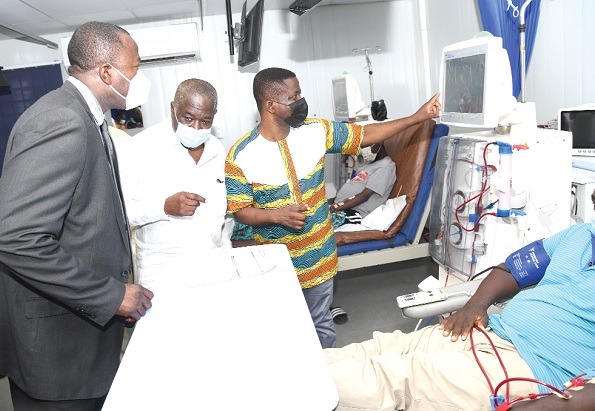
Korle Bu Teaching Hospital opens new dialysis centre
The Korle Bu Teaching Hospital (KBTH) has opened a new satellite dialysis centre, doubling its capacity for the treatment of kidney-related illnesses.
The centre, equipped with 15 dialysis machines, will ease pressure on the hospital’s current dialysis centre and improve access to dialysis facilities and services for kidney patients.
With the additional facility, the hospital now has the capacity to attend to 250 chronic kidney cases a week.
It was built with internally generated funds with support from companies and philanthropists.
The hospital is expecting 30 more dialysis machines in 2022 to complete the 45 set contained in the contractual agreement with the suppliers.
The agreement also includes a training and maintenance component that will ensure that technicians at the hospital are trained to man and maintain the machines.
Discussions with NHIS
The Board Chairman of the hospital, Dr David Nkansah-Dwamena, who inaugurated the facility, said the teaching hospital was engaging the National Health Insurance Scheme (NHIS) on the possibility of absorbing the cost of dialysis for chronic kidney diseases to ease the financial burden on patients.
He said the hospital was also working to improve kidney transplant services to position the facility as the preferred destination for kidney transplant services in West Africa.
He expressed the hope that with the ongoing construction of the Urology Centre of Excellence, it would also address the infrastructure challenges of the Renal Unit of the hospital when completed.
Dr Nkansah-Dwamena expressed appreciation to First Sky Group for its financial support to patients of the Renal Unit, and appealed to other corporate and benevolent organisations for further support.
That, he said, would help to reduce the cost of treatment and the mental stress associated with diseases on patients and their relatives.
More machines to improve care
The Chief Executive Officer (CEO) of KBTH, Dr Opoku Ware Ampomah, said the hospital was working to put in place incentive packages to check the high attrition rate of nurses who quit to work abroad for better conditions of service after acquiring experience at the unit.
The Head of the Kidney Unit of the KBTH, Dr Vincent Boima, expressed concerns about the rise in chronic kidney diseases in the country, with people between ages 20 and 50 years being the most affected lately.
He, therefore, appealed to the government to come to the aid of kidney patients by meeting them halfway of the cost of treatment to lessen the financial burden on them.
He cited Kenya as one of the countries where the government had absorbed two out of the three dialysis treatment sessions in a week for kidney patients to buttress his point.
Support
The Public Relations Manager of First Sky Group, Nii Lankai Lawson, said the outfit’s support to the Kidney Unit and kidney patients was merely a corporate social responsibility and service to society.
Indeed, the company is said to have invested GH¢20 million since 2015 in the unit to support the delivery of kidney-related health care to the public.
That support included First Sky Group bearing the cost of one of the three to four sessions of treatment for kidney patients at the dialysis unit.
The centre in a day provides dialysis treatment for about 46 patients.
